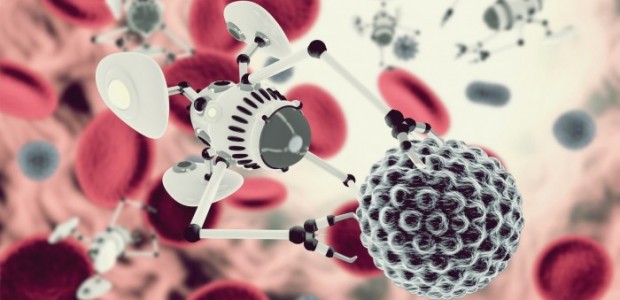When you think about the future of cancer treatment— does it include robots? Breaking news coming all the way from South Korea suggests that this could be the next step in the fight against cancer.
A team of scientists from Chonnam National University in Gwangju in South Korea have developed a new method of treating cancer that would be safer and more efficient than chemotherapy. They have built nanorobots that detect and attack cancerous cells without the additional damage of many modern therapies.
Here Come the Bacteriobots!
These aptly named “Bacteriobots” essentially are genetically-engineered non-toxic salmonella bacteria that can target tumors and deliver cancer treatments. The modified salmonella bacteria hones in on a tumor by tracking chemicals produced by cancer cells. The Bacteriobot travels directly to the tumor where it releases it’s medication payload, treating the affected area.
The nanorobots (measuring only 3 micrometers in length) are carried by the bacteria. Drug capsules are released automatically once the bacteria has made it to the tumor.
Limiting Collateral Damage
Contemporary cancer treatments can cause a lot of additional damage to surrounding tissue and organs in an effort to destroy cancerous cells and tumors. Researchers have long been working to develop more targeted therapies that will spare nearby healthy tissue.
“First of all, the main feature of Bacteriobot is that the robot has a sensing function to diagnose the cancer, and it’s attacking the cancer itself as it uses the bacteria’s brain while moving toward the tumor region with its flagella,” said Park Jong-Oh, the director of robot research initiative at Chonnam National University.
Incredibly, this is not the first time nanorobot technology has been tested for cancer patients. Duke scientists assembled a nanorobot known as “DNA nanocage” that had the ability to transport biomolecule as well.
Next Steps for this Nanorobot Technology
This Korean nanorobot treatment system has not been tested on human subjects yet. They have been able to target colorectal and breast cancer tumors in lab mice. Although it still is not approved to treat human cancer patients, the technology has been patented in the following countries:
- Europe
- United States
- Japan
The next steps is to get the system ready for human clinical trials and to apply it against other types of cancer– like cervical cancer.
“Our medical nanorobot, named ‘Bacteriobot,’ has very high efficiency as an anti-cancer treatment by selectively attacking cancer cells,” said Park. “In this regard, we have introduced a new paradigm in treating cancer, and I think the technology will further invigorate anti-cancer treatment.”

